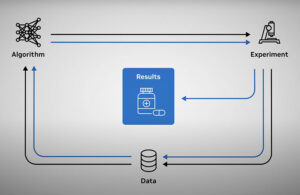
[NVIDIA]
We are able to design chips that energy self-driving automobiles and create physically-realistic video footage primarily based on textual content descriptions. But, as Genentech’s Aviv Regev identified in a session in regards to the firm’s lab in the loop at NVIDIA’s GTC convention, the common-or-garden cells inside us function with a complexity that also eludes our full understanding.
It seems {that a} cell is itself like a computational gadget with circuits and code, Regev mentioned. These molecular “circuits” work together with one another, obtain info, make choices, and execute them. “These molecular circuits — they’re arduous to reverse engineer,” she mentioned. That hasn’t stopped scientists from spending many years attempting to mannequin and predict their conduct. “Largely unsuccessfully, I can let you know,” Regev added.
However what if we may harness the identical technological energy driving these different breakthroughs to unravel this organic thriller? That is exactly Genentech’s purpose with its ‘lab within the loop’ method.
The facility of amount in unlocking mobile biology’s secrets and techniques

Aviv Regev, Ph.D.
The core of Genentech’s Lab-in-the-Loop method is to reimagine the research of organic techniques. Historically, scientists centered intensely on particular person cells or small teams. Whereas helpful, this left us with a fragmented understanding of the immense complexity inside our our bodies. “If we need to perceive and deal with a illness, we have to know our cells. We have to understand how they work, how they break down, and tips on how to repair them with medicines,” Regev mentioned.
The issue, as Regev places it, is scale. People are composed of tens of trillions of cells. With 1000’s of various cell sorts and states, and about 20,000 genes, there are mind-boggling attainable genomic combos.
Machine studying helps sort out the size downside. Now, as a substitute of intensely specializing in a couple of cells, researchers can generate unravel new patterns by analyzing lower-resolution information on hundreds of thousands of particular person cells. “It’s higher to have a look at very noisy and really partial measurements for tens of 1000’s or hundreds of thousands of particular person cells” than it’s to give attention to a single, totally measured cell, she mentioned. “Amount will turn out to be high quality.”
New applied sciences are serving to handle the issue of scale. Think about instruments like droplet-sequencing (Drop-seq) microfluidics that may profile vast numbers of cells. Or take into consideration the ramifications of the worldwide analysis initiative the Human Cell Atlas, which goals to map each cell sort within the human physique. A group of researchers contributing to the challenge have profiled tens of millions of cells from almost 10,000 individuals. Moreover, single-cell sequencing know-how has additionally enabled researchers to uncover beforehand unknown cell sorts, resembling ionocytes within the lungs, that are concerned in cystic fibrosis.
Making drug discovery extra predictive
Equally, Genentech’s Lab-in-the-Loop goals to evolve experimental and clinical data into computational models that generate predictions about potential drug candidates — how cells will reply to varied interventions. The loop within the title refers to a steady studying cycle that happens when the AI-generated predictions are examined in real-world lab experiments. The outcomes of those experiments then movement again into the fashions, making them smarter and extra predictive. “We are able to begin with an experiment, accumulate information, practice a mannequin on the information, after which use the mannequin to foretell the subsequent set of experiments and iterate,” Regev mentioned. “That sounds quite simple, so long as you are able to do it at scale.”
The Lab-in-the-Loop method is already beating human specialists at particular duties. Utilizing high-throughput information, one mannequin was about 54-fold higher in comparison with the unique method, which relied on professional medicinal chemists to pick out probably the most promising molecules to synthesize, Regev mentioned. “It additionally beneficial new platforms that weren’t imagined by the specialists.”
AI outperforming human specialists in outlined duties
One other Genentech mannequin, designed to imitate evolutionary rules for therapeutic antibody creation, additionally persistently outperforms human engineers. “Our mannequin, which we name Deep Health, discovers molecules which have one to 2 orders of magnitude higher affinity than what the specialists did,” Regev mentioned. “And when our human specialists first noticed the outcomes, they mentioned, ‘Oh, I might have by no means picked these.’” The purpose is to not replicate human specialists. “They want one thing that’s completely different from them,” Regev mentioned.
Genentech’s Lab-in-the-Loop method can uncover new drug targets, optimize interventions, and personalize therapy methods. The method has already produced tangible outcomes, offering insights into the event of the antibody candidate vixarelimab for interstitial lung illness and inflammatory bowel illness. In oncology, AI-powered evaluation of tumor DNA performed a task within the improvement of a customized neoantigen vaccine candidate generally known as iNeST, developed in collaboration with BioNTech.
Genentech lab within the loop focuses on rising information prospects
As datasets proceed to develop, Genentech’s Lab-in-the-Loop method goals to increase its attain throughout extra therapeutic areas. One other promising know-how is the emergence of multimodal fashions that unite distinctive information belongings. “Our current workforce now builds giant multimodal basis fashions that use all our information, particularly our proprietary information,” Regev mentioned. “The fashions are designed for each general-purpose duties like illustration studying or knowledge-grounded chat, but in addition duties which are particular for lab and scientific AI — basis fashions, brokers.”
Genentech’s partnership with NVIDIA goals to speed up each one of many Lab-in-the-Loop method’s elements, recognizing that drug discovery and improvement solely works when all the weather are working collectively.
Regev highlighted that the primary focus of utilizing AI in drug discovery isn’t about summary computing energy, however about enhancing sufferers’ lives. “Our work depends on all people — the lab, the clinic, the algorithms, the information, the fashions are solely pretty much as good as the information we practice them on, the questions we pose to them, and the actions we take” she mentioned. “We owe it to each one among our sufferers to be the very best.”
Filed Underneath: Drug Discovery and Improvement, machine studying and AI, Oncology, Uncommon illness
Tagged With: AI drug discovery, Aviv Regev, Genentech, lab-in-the-loop, multimodal basis fashions, NVIDIA, customized medication
